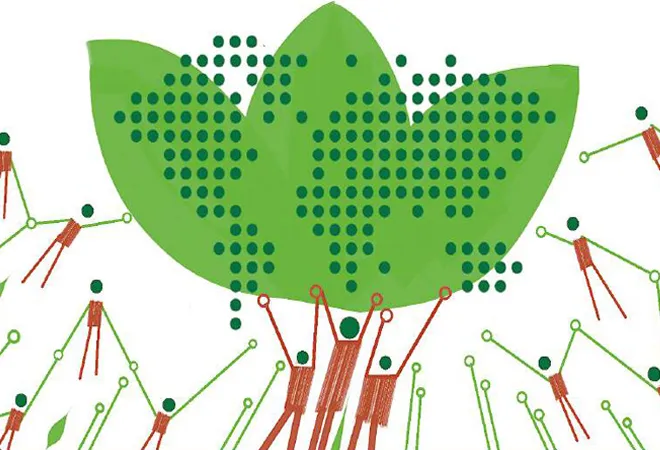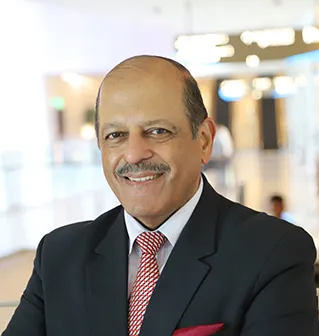INDIA’S
G20 PRESIDENCY began on December 1. It will be driven by the underlying vision of “Vasudhaiva Kutumbakam” (the world is one family), best encapsulated by the motto “One Earth, One Family, One Future”. The interconnectedness between geopolitics and global economic currents is undeniable and the global impact of climate change is irrefutable. In his remarks at the Closing Session of the G20 Leaders’ Summit in Bali, Prime Minister Narendra Modi rightly pointed out the linkages between inclusive development, gender equality, peace and security and the full use of technological innovations for universal benefit.
As the main “ideas bank” of the G20, the activities and deliberations of the Think20 (T20) engagement group of the G20 are spread over seven task forces.
The first task force on “Macroeconomics, trade, and livelihoods” has the mandate to make recommendations on coordination within the G20 to create coherence in monetary and fiscal policy, trade, investment, and supply chain resilience. The aim is to give further impetus to the initiatives taken by the Indonesian presidency to “Recover Together, Recover Stronger” in the post-pandemic period. With supply chain resilience emerging as a common concern against the backdrop of ineffective WTO mechanisms, the G20 has assumed the mantle as the most significant platform to forge consensus among the top 20 economies on international trade policy.
The task force on “Digital Futures” will en- deavour to build an inclusive digital public in- frastructure to ensure affordability and safe access by all. It will discuss the universal inter- operability of digital services. It will also ad- dress issues of digital financial inclusion and skills -- both integral to economic growth.
With supply chain resilience emerging as a common concern against the backdrop of ineffective WTO mechanisms, the G20 has assumed the mantle as the most significant platform to forge consensus among the top 20 economies on international trade policy.
One of the mainstays of India’s G20 Presidency is PM Modi’s concept of “Lifestyle for Environment” (LiFE), introduced at COP26 in 2021. Currently, the focus of climate change discussions revolves around nations and the behaviour at the individual level takes a back seat. The LiFE initiative aims to put the indi- vidual at the centre of the discourse and to sensitise every human being, regardless of na- tionality and geography. If individuals become more conscious of their lifestyle choices and act more responsibly, it can make a huge dif- ference. The focus on LiFE is a timely initiative given the fact that the deleterious effects of climate change on the economy and livelihood are felt the most by the vulnerable countries around the world. The recommendations of the task force on “LiFE, Resilience, and Values for Wellbeing” can play a pivotal role in arrest- ing the impending climate crisis, and also ensuring room for inclusive growth.
“Refuelling growth” will be the aim of the task force on green transitions as it recommends pathways for a smooth transition to clean energy without compromising on efforts for global economic revival in a post- pandemic world.
The task force on the “Global financial order” will examine the potential for realigning the global financial architecture. The challenge today is to restructure institutions in accordance with contemporary economic needs, including for infrastructure. Greater access to development finance and resource mobilisation through innovative methods is of key importance.
“Accelerating SDGs” is the focus of another standalone task force which will explore new pathways to deliver on the 2030 agenda through strengthened and sustainable collaboration. Given the earth’s finite re- sources, a shift towards a circular economy and deliberate and mindful consumption is likely to reduce waste and help build a virtuous cycle for development.
It is imperative to note that none of the stated objectives of the G20 can be achieved without commensurate reforms of multilateral institutions. The pandemic and the Ukraine war have once again exposed fragilities in the post-World War multilateral system. The inability of multilateral institutions to handle emerging crises, including climate emergencies and geopolitical tensions, has led to a loss of confidence in these institutions. The international community is looking for effective and accountable structures that can deliver better. It is to this end that the Task Force on “Reformed Multilateralism” will seek to create a roadmap for “Multilateralism 2.0”. A targeted reform agenda for key multilateral institutions, whether the United Nations or its affiliated frameworks such as the WHO, WTO and the ILO, must be undertaken. With sin- cere efforts, the global community can look forward to the birth of a more representative and egalitarian multipolar world order from the chrysalis of the G20.
Modi’s caution that “now is not an era of war” finds resonance everywhere. The international system today is wracked by contestation along several fronts, in trade, technology and territory. Ideological friction and the growing trust deficit compound the problem. The global community is at a crossroads. The choice is between sparking off a new Cold War with complex and overlapping camps undermining progress, or joining hands to re- cover from the ravages of the pandemic and dealing more effectively with bigger challenges like climate change.
The Leaders’ Declaration adopted at Bali at the Summit in November, acknowledges the importance of upholding international law to preserve peace and stability. As a key G20 member state, India can work with likeminded countries to devise a roadmap for Multilateralism 2.0.
The year ahead is an opportunity for India to share its values of truth and non-violence, as well as its inheritance of yoga, ayurveda and Vedanta, with others. Vasudhaiva Kutumbakam, the guiding canon for India’s Neighbourhood First Policy and Vaccine Maitri, places higher human values above narrow nationalism. It is an approach that is expected to permeate all aspects of India’s G20 Presidency.
Our T20 engagement group is acutely aware of the need to develop a roadmap founded on new morality and ethics coupled with sustainable economic systems that serve communities around the world. Of particu- lar importance is the need to mobilise finance capital for investments in disaster resilience and risk mitigation, especially for livelihood securitisation in vulnerable nations.
Under India’s leadership, the G20 can, and must, speak for the entire world, especially the Global South, build consensus and act as a catalyst for real change.
As PM Modi stated in Bali, global development is not possible without women's participation. India has taken the lead in realising this, with doors being opened to women across India in recent years in every field. From education of the girl child to special loan disbursements for women entrepreneurs and women in the defence forces, Indian society is rapidly changing. The G20 agenda must also accord priority to women-led development in the years ahead. Under India’s leadership, the G20 can, and must, speak for the entire world, especially the Global South, build consensus and act as a catalyst for real change.
Today, the essential oneness of all humankind espoused in Advaita philosopy can help the global community overcome the may ideological, military and economic di- visions that thwart progress, and enable it to look ahead with optimism. India truly has what it takes to lead an abundance of political will, a vision to match, and, compassion towards all.
The writer is the T-20 Chair for India’s G20 Presidency and Director General of the Manohar Parrikar Institute for Defence Studies and Analyses. Views are personal
This commentary originally appeared in The Indian Express.
The views expressed above belong to the author(s). ORF research and analyses now available on Telegram! Click here to access our curated content — blogs, longforms and interviews.




 PREV
PREV


